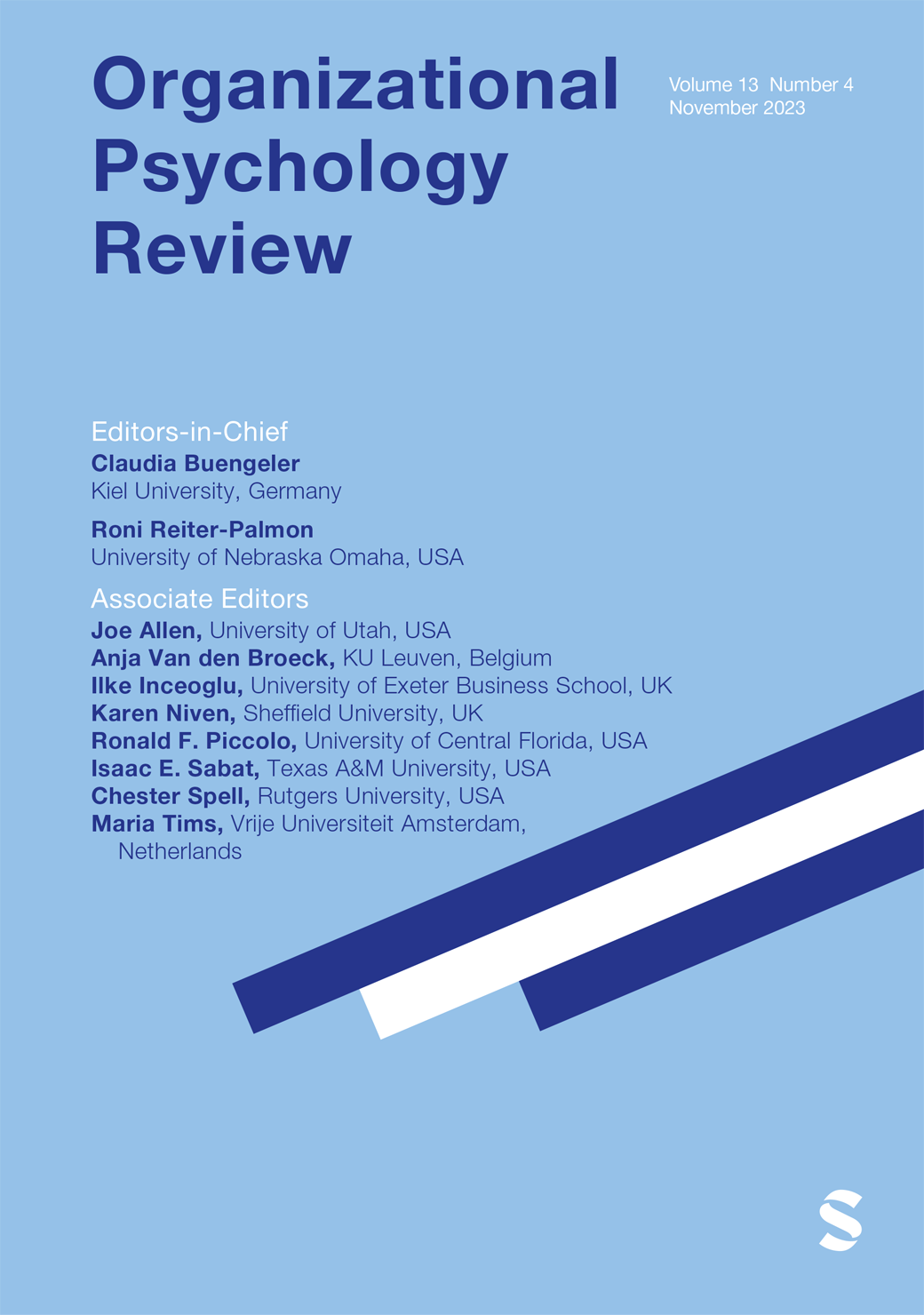自主或受控的自我调节,这是一个问题:从自我决定的角度来看通勤对员工特定领域功能的影响
IF 7.1
1区 心理学
Q2 MANAGEMENT
引用次数: 2
摘要
少数考虑通勤期间心理过程的研究描绘了一幅模糊的画面,一些研究强调通勤的负面影响,另一些则强调通勤的积极后果。根据自决理论,我们开发了一个框架,该框架扩展了通勤的成本和收益,以促进员工随后在工作和家庭中与领域相关的功能。具体而言,我们提出员工的基本需求满足以及自主和受控的自我调节过程,作为解释心理通勤特征如何通过体验的主观活力渗透到领域相关功能的机制。在这样做的过程中,我们引入了心理通勤特征的分类,并强调了将这些潜在的主观特征与通勤环境的客观方面分开的重要性。我们的研究鼓励学者进行人内和人与人之间的研究,以考察客观的通勤环境和相关的心理通勤特征如何影响员工的自我调节。简明语言总结通勤期间发生的事情并不局限于通勤的范围:交通堵塞等厌恶性经历可能会导致工作或家庭活动的参与度降低。同样,不间断地上班等积极事件也会对后续体验产生积极影响,比如在工作或家中执行任务时的流动(即完全投入)。这怎么解释呢?我们的文章建议通勤者在上下班时进入动机状态。例如,他们觉得一切都很容易,在自己的控制下(自主自我调节),或者他们觉得通勤是费力的,是外部决定的(受控自我调节)。这些动机状态会影响通勤后的主观活力,进而预测员工在工作或家庭中的表现。重要的是,虽然通勤环境的客观方面(例如,通勤时间或交通工具)对这些动机状态有影响,但我们认为,它们是通过通勤者感知的心理通勤特征来影响的。我们关注后者,并预测员工在通勤期间的动机状态,以满足他们的基本需求的形式(即,在通勤期间感到自主、胜任和相关),这是由不同的心理通勤特征(决策自由度、心理刺激、社会特征、身体方面、不安全感)决定的。我们的工作可以启发研究,调查为什么不同的员工对通勤的看法不同,以及为什么同一名员工在日复一日的通勤过程中可能会经历不同的动机状态。最后,我们为社区、组织和通勤者自己提出了切实可行的建议。本文章由计算机程序翻译,如有差异,请以英文原文为准。
Autonomous or controlled self-regulation, that is the question: A self-determination perspective on the impact of commuting on employees’ domain-specific functioning
The few studies that have considered psychological processes during the commute have drawn an ambiguous picture, with some emphasizing the negative and others the positive consequences of commuting. Drawing on self-determination theory, we develop a framework that expands on the costs and benefits of commuting for employees’ subsequent domain-related functioning at work and home. Specifically, we propose employees’ basic needs satisfaction and processes of autonomous and controlled self-regulation as mechanisms that explain how psychological commute characteristics spill over to domain-related functioning through experienced subjective vitality. In doing so, we introduce a taxonomy of psychological commute characteristics and highlight the importance of separating these underlying subjective characteristics from objective aspects of the commuting environment. Our research encourages scholars to conduct within- and between-person studies to examine how the objective commute environment and associated psychological commute characteristics affect employees’ self-regulation. Plain Language Summary What happens during the commute does not stay within the boundaries of the commute: Aversive experiences such as being stuck in a traffic jam may spill over to lower engagement in work or home activities. Similarly, positive incidents such as flowing to work uninterruptedly can positively impact subsequent experiences such as flowing (i.e., being fully engaged) when performing tasks at work or at home. How can this be explained? Our article suggests that commuters enter motivational states when going and coming from work. For instance, they feel that everything is going easy and under one's control (autonomous self-regulation) or they feel that the commute is effortful and externally determined (controlled self-regulation). These motivational states influence subjective vitality after the commute, which in turn predicts how employees function at work or at home. Importantly, while objective aspects of the commute environment (for instance, the length of one's commute or one's means of transportation) have an impact on these motivational states, we argue that they do so via psychological commute characteristics perceived by the commuter. We focus on the latter and predict employees’ motivational state during the commute in the form of the fulfillment of their basic needs (i.e., feeling autonomous, competent, and related during the commute) as determined by different psychological commute characteristics (decision latitude, psychological stimulation, social characteristics, physical aspects, insecurity). Our work can inspire research that investigates why different employees perceive their commute differently as well as why the same employee may experience different motivational states during their commute from day to day. We end with practical recommendations for communities, organizations, and the commuter themselves.
求助全文
通过发布文献求助,成功后即可免费获取论文全文。
去求助
来源期刊

Organizational Psychology Review
Multiple-
CiteScore
10.00
自引率
1.60%
发文量
25
期刊介绍:
Organizational Psychology Review is a quarterly, peer-reviewed scholarly journal published by SAGE in partnership with the European Association of Work and Organizational Psychology. Organizational Psychology Review’s unique aim is to publish original conceptual work and meta-analyses in the field of organizational psychology (broadly defined to include applied psychology, industrial psychology, occupational psychology, organizational behavior, personnel psychology, and work psychology).Articles accepted for publication in Organizational Psychology Review will have the potential to have a major impact on research and practice in organizational psychology. They will offer analyses worth citing, worth following up on in primary research, and worth considering as a basis for applied managerial practice. As such, these should be contributions that move beyond straight forward reviews of the existing literature by developing new theory and insights. At the same time, however, they should be well-grounded in the state of the art and the empirical knowledge base, providing a good mix of a firm empirical and theoretical basis and exciting new ideas.
 求助内容:
求助内容: 应助结果提醒方式:
应助结果提醒方式:


